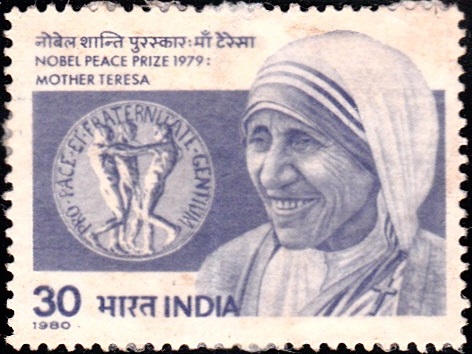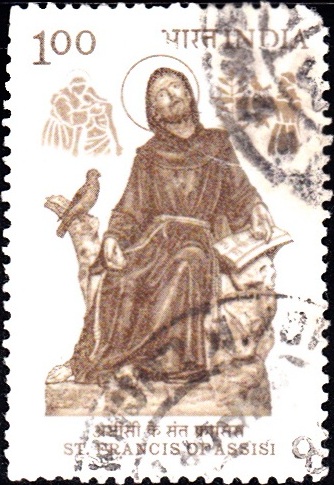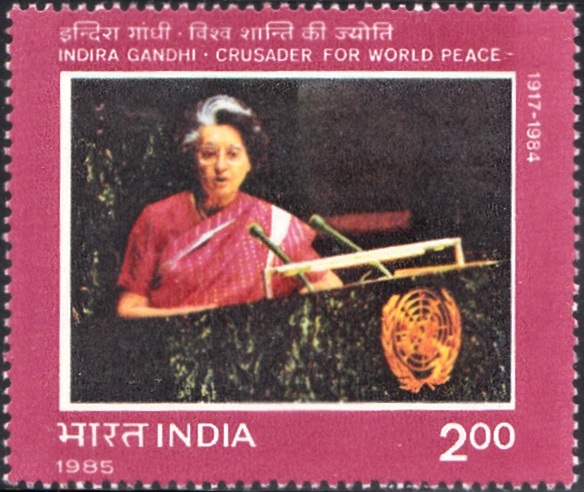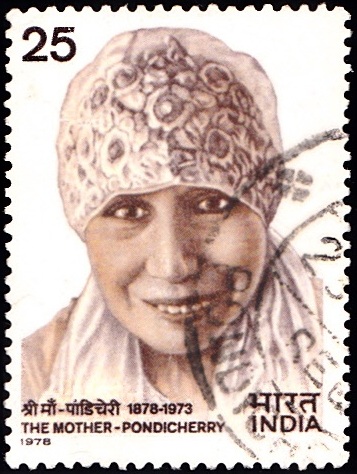
India on Mother Teresa 1980
A commemorative postage stamp on Saint Teresa of Calcutta, an Albanian-Indian Roman Catholic nun and missionary :
Issued on Aug 27, 1980
Issued for : Indian Posts and Telegraphs Department feels honoured to issue a stamp to commemorate the noble work of Mother Teresa and her band of devoted associations.
Description of Design : The stamp carries the portrait of Mother Teresa along with the facsimile of the reverse of the Nobel Peace Prize medallion. The first day cover designed by Charanjit Lal is a collage of her portraits with her message. The cancellation includes a line drawing showing her with a child.
Type : Stamp, Postal Used
Colour : Ultramarine Blue
Denomination : 30 Paise
Overall size : 3.91 X 2.90 cms.
Printing size : 3.55 X 2.54 cms.
Watermark : Printed on watermarked adhesive stamp paper
Number printed : 20,00,000
Number per issue sheet : 35
Printing process : Photogravure
Designed and printed at : India Security Press
Name : Anjezë Gonxhe Bojaxhiu
Born on Aug 26, 1910 at Skopje, Republic of Macedonia
Died on Sep 5, 1997 at Kolkata, India
About :
- Her face deeply seamed with the passing years, Mother Teresa in her blue-bordered, coarse cotton white sari is a familiar figure on the streets of Calcutta and is held in deep affection by the people not only of Calcutta but of the whole country.
- She was born on 27 August 1910 to Albanian parents in Skopje (Yugoslavia) and was baptized Agnes. From an early age, she cherished the desire to “go out and give the love of Christ“. Inspired by the tales of work done in Bengal by the Irish Order of the Sisters of Loreto, she joined the Order at the age of 18. She came out to India on 6 January 1929 and began teaching Geography at St. Mary’s High School in Calcutta. On a train ride on 10 September 1946 to Darjeeling for the annual retreat, she felt the touch of a divine command. The message was to leave her cloistered existence and plunge into bustling Calcutta to care for “the poorest of poor”. When the Church granted her permissions to lay aside her habit, she donned the now well-known blue-bordered, white coarse cotton sari and left the cloistered arbours of the convent on 18 August 1948, never to return. All she shed with her then was five rupees, her unfailing faith and tremendous determination.
- She founded the Missionaries of Charity in Calcutta on 7 October 1950 and her simple blue-edged white sari came to be its uniform. The Missionaries of Charity have since grown into a worldwide order numbering more than 1800 nuns, 250 brothers and thousands of lay co-workers, who serve the sick and the poor in 30 countries. The order has built leprosariums, children’s homes, havens for women, the handicapped and the old. For every kind of tragedy, Mother Teresa and her nuns manage to create a measure of consolation. The deepest consolation offered, though, is something that goes beyond physical care. “For me each one is an individual“, Mother Teresa once explained. “I can give my whole heart to that person for that moment in an exchange of love. It is not social work. We must love each other. It involves emotional involvement, making people feel they are wanted“.
- The enormous and compassionate work evoked worldwide recognition. Award following award, from the Padmashree (1962), the Magsaysay Award (1962), the Pope John XXIII Peace Prize (1971), the John F. Kennedy International Award (1971), the Jawaharlal Nehru Award for International Understanding (1972), the Order of St. Francis of Assisi (1974), to the Nobel Peace Prize (1979).
- (The above text is based on material published elsewhere and/or supplied by the sponsors).








Very valuable details of the stamps given.
What should be its price
[…] over the world. It is his prayer “Lord make me an instrument of peace….” which Mother Teresa made her […]